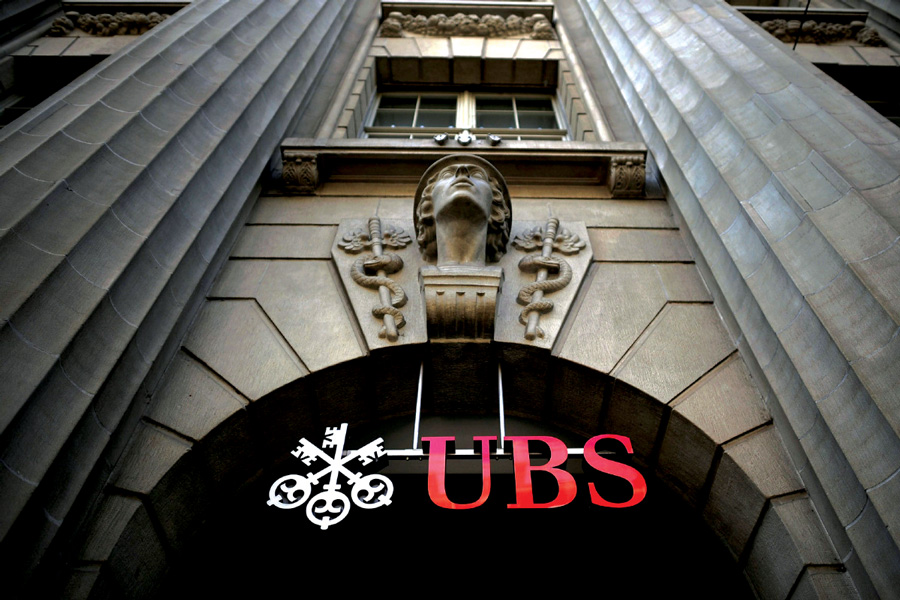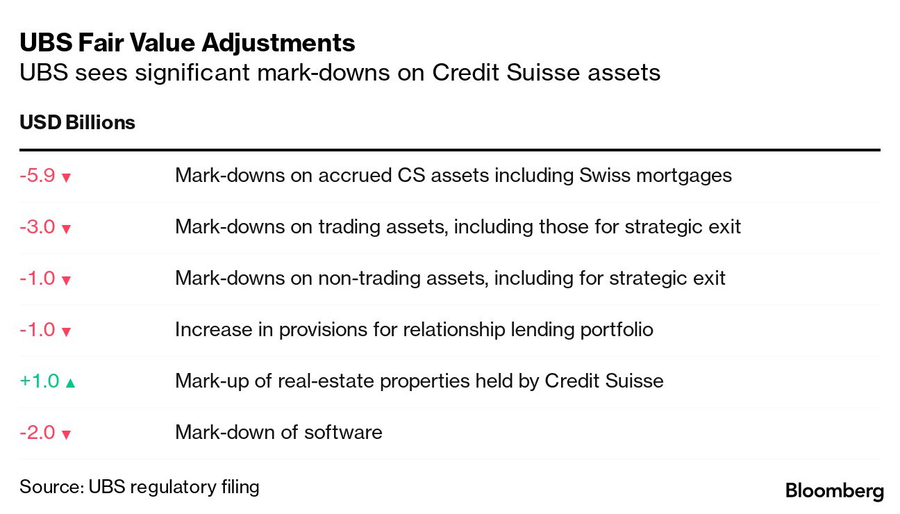

UBS Group is gearing up for an estimated $34.8 billion gain as a result of its emergency takeover of Credit Suisse Group, while warning that it faces billions in potential legal and regulatory costs from the rescue of its stricken former rival.
The Swiss bank stands to benefit from the combined firms’ negative goodwill, based on a first assessment it has made on data as of the end of 2022, according to a regulatory filing posted overnight in Switzerland. At the same time, UBS sees markdowns of about $13 billion on Credit Suisse assets and is also estimating that legal liabilities may cost as much as $4 billion over 12 months.
The figures are based on the bank’s best estimates now, and as further analysis is performed are likely to change, UBS said. Negative goodwill occurs when the book value of a company is more than the price paid by the acquiring firm, and can result in a profit on paper for the buyer when the deal closes.
UBS agreed to take over Credit Suisse this year in an emergency sale backed by the Swiss government, amid fears that the smaller troubled competitor was hurtling toward bankruptcy. Analysts have pointed out that Credit Suisse’s local business, the Swiss Universal Bank, is probably worth multiple times what UBS paid for the company.
UBS shares were up 0.2% at 17.20 Swiss francs ($19.134) as of 1:35 p.m. in Zurich.
Still, if UBS reports a windfall from negative goodwill, many investors will view it as an accounting quirk rather than a sign of strength of the underlying business. And executives, aware that a paper windfall could prove unpopular in Switzerland, have been quick to point out the risks they’re taking on in an integration that may take several years.
Bloomberg had previously reported that the bank could make a gain of as much as 51 billion Swiss francs from the negative goodwill before any assets write-downs. That was based on calculations of a Credit Suisse book value of 54 billion francs at the end of March and the 3 billion francs UBS is paying.
The accounting gain stands to be among the biggest ever reported by a bank in a single quarter, potentially easily surpassing the previous benchmark. JPMorgan Chase & Co.’s $14.3 billion profit in the first quarter of 2021 is the modern record for U.S. and European lenders.
UBS is benefiting from a 9 billion Swiss franc state guarantee for a certain portion of losses that it may incur on Credit Suisse positions. Yet UBS Chief Executive Sergio Ermotti said last week that it was “exceptionally unlikely” that the government will end up taking a financial hit.
Nevertheless the bank made a series of preliminary estimates on the mark-downs that may be needed when the deal closes. A revaluation of some $5.9 billion was estimated on assets including Swiss mortgages and one of $3 billion on trading assets including those that the bank will ultimately exit. UBS has indicated that it plans to significantly shrink Credit Suisse’s loss-making investment bank.

UBS staff are currently involved in a process of due diligence into its acquired rival, with the deal set to close in the coming weeks.
Unlike in more standard acquisitions, UBS was unable to conduct a months-long review of the bank’s books. UBS has sent in a so-called clean team to assess its former rivals’ client rosters and talent, as well as which business lines should be earmarked for a wind-down unit, people with knowledge of the matter have said.
Credit Suisse had a long list of legal entanglements that may end up costing UBS. Unresolved cases span an embarrassing criminal conviction for facilitating a Bulgarian cocaine trafficker’s money laundering to a half-a-billion dollar settlement in a bribery scandal related to a tuna fishing fleet in Mozambique.
The disclosures lend “further support to our more cautious stance on UBS,” Thomas Hallett and Andrew Stimpson, analysts at Keefe Bruyette & Woods, wrote in a note to clients. “With many unknowns and potential risks to work through, we believe investors are better served sitting on the sidelines until visibility improves.”

Two longtime RIA industry figures have joined the board of directors at TaxStatus, a fintech company that garners thousands of IRS data points on clients to share with advisors for improved financial planning oversight and time savings.

Sieg, 58, was head of Merrill Wealth Management, left in 2023 and returned that September to Citigroup, where he worked before being hired by Merrill Lynch in 2009.

Firms announce new recruits including wirehouse breakaways.

"QuantumRisk, by design, recognizes that these so-called "impossible" events actually happen, and it accounts for them in a way that advisors can see and plan for," Dr. Ron Piccinini told InvestmentNews.

Advisors who invest time and energy on vital projects for their practice could still be missing growth opportunities – unless they get serious about client-facing activities.
Orion's Tom Wilson on delivering coordinated, high-touch service in a world where returns alone no longer set you apart.
Barely a decade old, registered index-linked annuities have quickly surged in popularity, thanks to their unique blend of protection and growth potential—an appealing option for investors looking to chart a steadier course through today's choppy market waters, says Myles Lambert, Brighthouse Financial.
